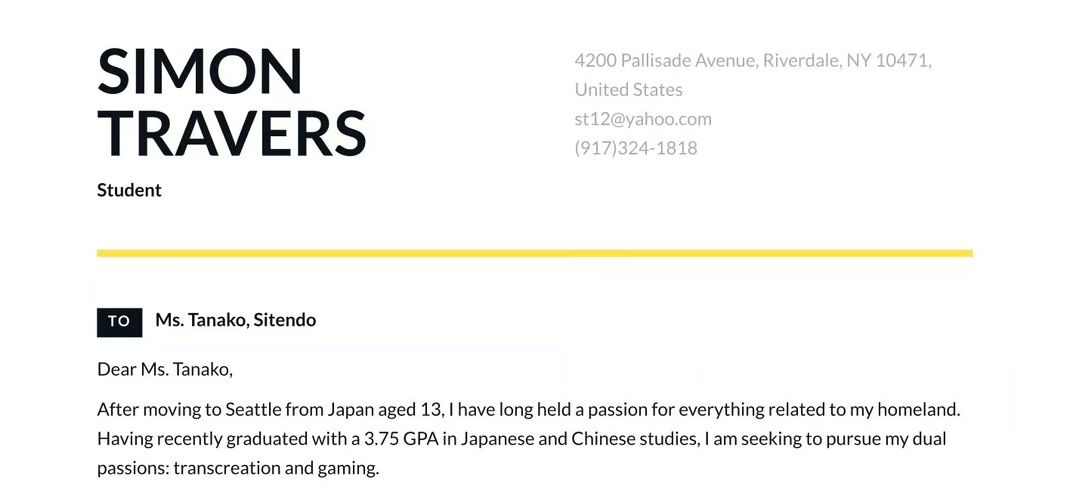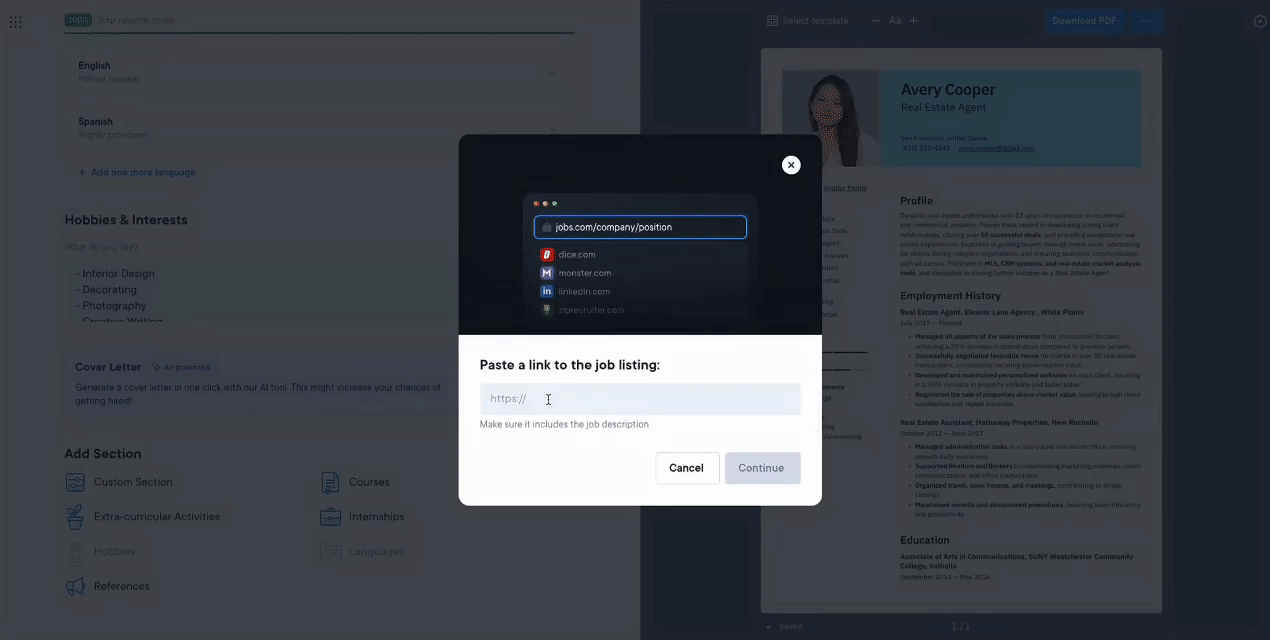Writing a cover letter when you’re new to the workforce or changing career paths can feel overwhelming. It’s easy to think, “Why bother?” and skip it altogether. But don’t make that mistake—a well-written cover letter can truly set you apart.
It’s your chance to show who you are beyond your CV—your motivations, transferable skills, career goals, and a twist of personality. Consider that empty page the first chapter of your professional journey.
We’ll guide you through how to write a cover letter with no experience that makes employers take notice.
Templates for cover letters with no experience
Looking for some inspiration on how to write a cover letter with no experience? Check out these cover letter templates to help you get started:
Internship
Singapore template
Crafting a cover letter for an internship might seem tricky, but it’s more straightforward than you might expect. There’s a great deal you can highlight, even with limited experience. Follow our step-by-step guide here.
Student
Berlin template
Use this student cover letter example to complete your application and secure a role quickly—no stress, no uncertainty. This example has been specifically crafted for student positions in 2025.
Career change
Milan template
Embarking on a new career challenge can be both thrilling and a little daunting. Take the first step with a career change cover letter that sets you up for your fresh path.
Tips for writing a cover letter with no experience
Crafting a cover letter for a job with no experience might seem challenging, but with the right structure and a helpful cover letter template, it can actually be easier than you think. The key is to ensure that your letter contains relevant and compelling information, structured in an organised and professional way.
Adopting a clear and simple format will make it easy for the hiring manager to read your cover letter.
Typically, a well-written cover letter should include the following elements:
- A cover letter header with your name and contact details
- A personalised greeting using the hiring manager's name
- A brief introduction to start the cover letter
- The main body outlining your relevant skills, qualities, or motivations
- A closing paragraph with a call to action
- A professional sign-off with your name
For more detailed information, read our expert guide on how to write a cover letter.
1#: Start with a strong opening

Since recruiters typically review a large number of applications, it's important to make a strong impression right from the start. The goal of your cover letter opening paragraph is to do just that! Hook the reader so that they feel compelled to read on and learn more about you.
Start off your no experience cover letter by clearly stating the role you’re applying for and the name of the company. It’s also important to express your enthusiasm for joining the organisation. Take some time to explore their website or social media channels so that you can tailor your introduction and show that you’ve done your research.
Consider opening your cover letter with something distinctive—like a compelling anecdote or impressive achievement—that connects directly to the role.
Here are some examples:
- Relevant achievements. For example, if you’re applying for a customer service role, describe experiences that show your strong interpersonal skills—such as coordinating a community fundraiser which reflects the ability to engage with others effectively.
- Interesting fact about the company. Highlight something unique about the organisation from your research, such as their commitment to sustainability, any recent awards, or the launch of an innovative product or service.
- Connection to the company. Showing genuine interest and familiarity with a potential employer can quickly establish a connection. If you've been a loyal customer for years and love their brand or have been referred by a current employee, mention this in your opening paragraph.
- Respect for the founder or hiring manager. Research the person behind the business—they might have built the company from scratch or supported causes that you care about. Referencing this can help show your motivation and alignment with their values.
Follow this example to create a strong opening paragraph:
Dear Anna Smith,
I’m pleased to apply for the Marketing Assistant role at Brightwave Group. I’ve followed your campaigns for clients like EcoForm and CityNest, and have been especially impressed by your bold, data-driven approach to brand storytelling. I was referred by Sam Wilson, who speaks highly of the creative freedom and strategic collaboration he's experienced since joining your team.
2#: Showcase transferable skills
One of the most important elements to highlight in your cover letter with no experience are the transferable skills you can bring to the role. These are the skills or abilities you have gained through your education, volunteer work, or extracurricular activities.
The skills you include in your no experience cover letter should align with those mentioned in the job description. However, it’s completely fine if you don’t have many technical skills to list.
Research recently conducted by LinkedIn reveals that most companies place a higher value on candidates with strong workplace or transferable skills, as these are often harder to teach.
According to LinkedIn’s data, the most in-demand skills include:
- Communication
- Customer service
- Leadership
- Project management
- Analytics
- Teamwork
- Sales
- Problem solving
- Research
Reflect on situations where you’ve used these skills in action and think about how those experiences would help you in the workplace. For instance, you may have organised a charity event at college that boosted your project management, teamwork, and communication skills. Highlight these abilities in your cover letter and explain how you plan to use them in the role.
Here’s an example of how to showcase transferable skills effectively:
As treasurer for my university’s Entrepreneurship Club, I managed a £4,000 budget, overseeing spending, maintaining accurate records, and preparing financial updates for the team. We successfully launched UniSwap (a sustainable student marketplace) and won the Enterprise Award in the following year. At the same time, I successfully balanced my academic studies through careful organisation and time management.
3#: Share your passion and motivation
Employers understand that everyone needs to start somewhere. What they’re often looking for in a job application is genuine enthusiasm and a clear reason why you've chosen to pursue a particular path. Use your cover letter to explain what sparked your interest in the industry or role, and what continues to drive that interest.
Rather than using generic phrases, try to be specific. Perhaps a personal experience, an early interest, or even a particular challenge led you to this career path. For instance, if you’re applying for a position at a publishing house, you might mention how editing your university magazine helped you discover a passion for clear and compelling storytelling.
Here are some ideas to help you express your motivation in a natural and sincere way:
- Describe a meaningful experience that shaped your career interests.
- Share how your personal values align with the company.
- Draw a connection between your key strengths and the demands of the role.
- Mention a person, project, or event that inspired your interest in your chosen field.
Check out this example below:
My passion for edtech began when I started using digital tools to engage my tutoring students and saw how even small changes could transform learning. That sparked a deeper interest in how technology can support education. Since then, I’ve built my digital skills and am now looking to move into edtech development, combining my tutoring experience with a drive to create impactful, student-focused solutions.
4#: Highlight your growth-mindset
Having a positive attitude and willingness to develop can be just as important as experience. Employers appreciate applicants who are proactive about learning and open to feedback. In your no experience cover letter, include an example of a time when you picked up something new quickly or stepped outside of your comfort zone to take on a new challenge.
You should also highlight any steps you’ve already taken to familiarise yourself with the role or industry, such as:
- Degrees or formal qualifications relevant to the field
- Relevant courses or online classes you’ve completed
- Industry workshops, seminars, or conferences attended
- Memberships in relevant professional organisations
- Mentorship programmes within the industry
- Job shadowing experience
- Voluntary work related to the sector
- Self-directed learning through podcasts, books, blogs, or newsletters
Although new to the digital marketing industry, I have completed the Google Digital Garage course and am currently finalising the CIM Level 3 Award in Digital Marketing. I’ve also helped a friend’s small business increase their social media engagement by 25% over two months by experimenting with different content and posting times. Now I'm eager to apply what I’ve learned in a more professional setting and contribute to meaningful, results-driven campaigns.
5#: Wrap up with an engaging closing statement
Conclude your no experience cover letter with a professional closing paragraph. Reaffirm your enthusiasm for the role and briefly highlight what you can bring to the team—such as your transferable skills, eagerness to learn, and genuine interest in the position.
- Keep your cover letter concise. Ideally 200 to 400 words on one page. Check out our short cover letter example.
- Use clean, professional formatting. Set one-inch margins, left-align your text, single space, and use a professional font.
- Repeat or regurgitate information on your CV. Think of your cover letter as a complement to your CV.
- Forget to proofread your letter. Even a small spelling or grammatical error can create a poor impression.
It’s also helpful to encourage the hiring manager to get in touch by expressing your interest in an interview or further discussion. End with a polite and professional sign-off, such as “Yours sincerely” or “Kind regards,” followed by your full name. Include your contact details unless they have already been submitted elsewhere in the application.
Here’s an example of how to end a cover letter with no experience:
I would jump at the chance to apply my strong organisational skills and enthusiasm for learning to work for Stratton & Vale, and would love the opportunity to discuss how I could contribute to your team. You can reach me at [phone] or [email]. Thank you for your time and consideration—I look forward to hearing from you soon.
Yours sincerely,
Felicity Gray
Cover letter with no experience examples
Avoid the dreaded writer's block. Use these cover letter examples with no experience to get some inspiration when creating your own:
Internship cover letter example
Student cover letter example
Graduate cover letter example
Career change cover letter example
Frequently asked questions
Here are some frequently asked questions about how to write a cover letter with no experience:
How do I write a cover letter for a job with no experience in that field?
Focus on the key transferable skills you’ve gained through other experiences like volunteering, part-time work, or university projects. Highlight abilities such as communication, teamwork, or problem solving, and link these directly to the job.
The goal is to show your enthusiasm for the role and industry, and explain why you're keen to make this move.
Can I use AI to help write my cover letter with limited experience?
Artificial intelligence (AI) tools can help you match your skills and personality to a specific role. Some tools, like our Cover Letter Builder, even allow you to tailor your cover letter to the specific job description.

If you use AI to draft your no experience cover letter, be sure to review and edit the content so that it reflects your own voice and includes the most relevant keywords.
Should I mention my lack of experience in a cover letter?
You don’t need to highlight your lack of experience. Instead, focus on the strengths and skills you will bring to the role and your willingness to learn.
If you do mention it, keep it brief and positive, showing confidence in your ability to grow into the role.








